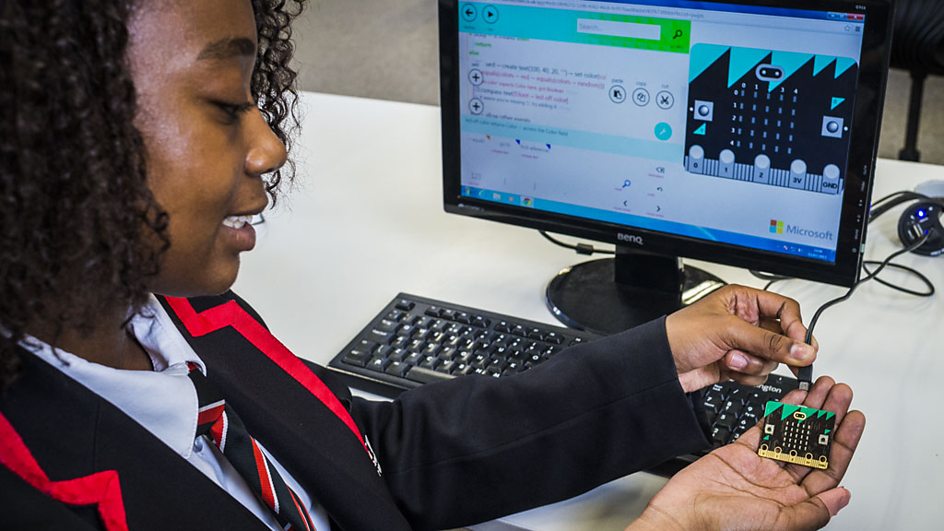Affiliate links on Android Authority may earn us a commission. Learn more.
BBC Micro:bit computer lands in UK student hands today

Today, the BBC has begun shipping out its tiny Micro:bit programmable computers to Year 7 students in UK schools, and the devices will be arriving up and down the country over the next few weeks. The new Micro:bit is the spiritual successor to the 1981 BBC Micro, which is credited with introducing a generation of children to computers and coding.
The release of the BBC Micro:bit was originally delayed from its planned October launch, following some power supply and then “fine tuning” issues. Although the delay now means that the launch is taking place part way through the school year, students get to keep their Micro:bit to play around with outside of the curriculum and there’s a whole website dedicated to getting kids started.
ARM, which designed the Cortex-M0+ microprocessor core implemented in the Nordic nRF51822 chip that powers the BBC Micro:bit, hopes that the development board will inspire UK school children into technical careers.
“The ability to code is now as important as grammar and mathematics skills and it can unlock important new career options. I can easily imagine a new wave of design entrepreneurs looking back and citing today as the day their passion for technology began.” – Simon Segars, CEO of ARM.
The Micro:bit has been developed with the help of 31 different partners, including ARM, Microsoft, and Samsung. The latter developed an Android app that can be used to code the device directly from your smartphone. If you would like to see a little of what the chip is capable of, take a look at the video below:
Of course, hobbyist electronics isn’t just for kids. If you would like to tinker around with one yourself, the BBC Micro:bit’s software will soon be open sourced and the device will be available to purchase from retailers in the not too distance future.
Alternatively, there are a huge number of micro-controller boards already available from the likes of Arduino, Teensy, and ARM’s own mbed platform, which are all pretty easy to get started with. Perhaps you already have a few of your own home brew creations on the go already?
[press]
ARM Says BBC micro:bit Will Inspire UK School Children Towards Tech Careers
Cambridge, UK, March 22, 2016 – The BBC micro:bit can have the same impact its predecessor, the BBC Microcomputer, had in the 1980s by instilling a passion for coding in a new generation of British school children. This is according to ARM, the UK’s most successful technology company and NXP and Nordic, both leading global providers of silicon chip products. The pocket-sized computers featuring ARM®-based NXP microprocessors and Nordic Bluetooth chips will be in the hands of thousands of 11-12 year old children from today as one million devices start arriving in UK schools. The initiative aims to inspire digital creativity in a new generation of innovators pursuing science, technology, engineering and maths (STEM) related careers.
“The BBC Micro started me on my journey towards a career in technology and the BBC micro:bit can have the same effect on children receiving their devices from today,” said Simon Segars, CEO of ARM. “The ability to code is now as important as grammar and mathematics skills and it can unlock important new career options. I can easily imagine a new wave of design entrepreneurs looking back and citing today as the day their passion for technology began.”
“Children seem to love the high-tech devices they use every day but perhaps they don’t always aspire to one day design their own products,” said Svenn Tore Larsen, CEO of Nordic Semiconductor. “With the Nordic nRF51822 Bluetooth® Smart SoC providing the connectivity for the micro:bit, we are helping to change that by enabling young people to engage with smart technologies and learn valuable new coding skills from a young age. The chip has an ARM Cortex®-M0 core at its heart, connecting micro:bits to each other and to the wider world.”
“This is a proud moment in the advancement of technology and education,” said Rick Clemmer, CEO of NXP. “We’re inspiring new secure connections for the smarter world by joining with the BBC and our industry partners in this exemplary program. Together, everyone involved in the BBC micro:bits initiative is truly stimulating innovation, motivating the next generation of technologists, scientists and entrepreneurs in their pursuit of a better future.”
Demonstration:
Please visit ARM’s YouTube channel to see Jonny Austin, technical lead for ARM on the BBC micro:bit project, staging a juggling demonstration with three micro:bit devices to show a real-world fun application of the technology.
Further information about the BBC micro:bit:
- Enabled by ARM mbed™ hardware and software development kits and compiler services.
- Contains an ARM Cortex®-M0 based Nordic nRF51822 MCU featuring Bluetooth 4.0 to provide connectivity to billions of connected devices and let children experiment with bringing their projects to the internet of things.
- Features the Cortex-M0+ based Kinetis KL26Z microcontroller designed by NXP, which provides USB connectivity and allows the micro:bit to be programed as simply as placing a file on a USB disk.
- The device has a 25 LED matrix display, a micro USB connector, a 3-axis accelerometer and a 3-axis magnetometer.
Please visit the ARM’s BBC micro:bit page for additional technical information.
[/press]